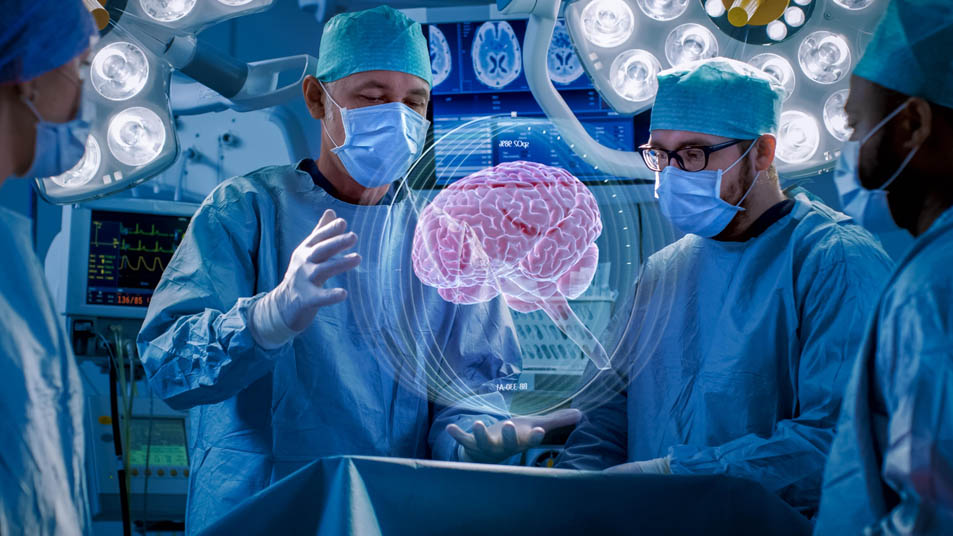
Neurosurgery is a specialized medical field focused on the diagnosis, treatment, and surgical management of disorders affecting the nervous system, which includes the brain, spinal cord, and peripheral nerves.
Neurosurgery is a demanding field that requires extensive training, including medical school, a neurosurgical residency, and often additional fellowship training. Neurosurgeons must have a deep understanding of the nervous system's anatomy and physiology, as well as the technical skills to perform delicate and complex procedures. The field is continuously evolving with advancements in
technology, such as minimally invasive techniques and robotic-assisted surgery, which improve outcomes and recovery times for patients.
In addition to operating on your neurological system, Neurosurgeons can administer nonsurgical care. Before suggesting surgery, they usually attempt all nonoperative treatment options, including prescription drugs, steroid injections, and physical therapy.
Additionally, Neurosurgeons are capable of diagnosing and treating diseases that impact the supporting structures of your neurological system, such as:
Your skull.
Spinal vertebrae.
Spinal disks.
Blood vessels.
Protective membranes and soft tissues.
Neurosurgeons are highly trained medical professionals who perform surgeries to treat a wide range of conditions, such as:
1. Brain Tumors : Removal of benign or malignant tumors in the brain.
2. Spinal Disorders : Treatment of herniated discs, spinal stenosis, and spinal tumors.
3. Cerebrovascular Disorders : Surgical interventions for aneurysms, arteriovenous malformations (AVMs), and strokes.
4. Trauma : Management of head injuries and spinal cord injuries.
5. Epilepsy : Surgical procedures to remove or alter areas of the brain causing seizures.
6. Functional Disorders : Deep brain stimulation (DBS) for Parkinson's disease, dystonia, and other movement disorders.
7. Congenital Anomalies : Correction of congenital malformations like spina bifida.
Diagnosis of Neurologic conditions :
Additionally, Neurosurgeons are highly trained in the diagnostic and therapeutic procedures involving Neurological disorders. They are proficient in using and evaluating the following testing apparatuses :
CT (computed tomography) scans.
MRI (magnetic resonance imaging) scans.
PET (positron emission tomography) scans.
Magnetoencephalography (MEG).
Electroencephalograms (EEG).
Types of Surgeries performed by Neurosurgeons :
The type of surgery and operation a Neurosurgeon perform, depends on the area of your nervous system, as well as any supporting tissues and structures that are impacted.
Types of Brain surgery include :
Removal of blood clots.
Stoppage of brain hemorrhage
Tumor excision.
Repair of aneurysm.
Healing from trauma.
Insertion of shunt.
Types of Peripheral Nerve surgery include :
Release of carpal tunnel.
Release of ulnar nerve.
Stimulation of the Vagus nerve
Types of Spine surgery include :
Stereotactic radiosurgery of the spine.
Disk replacement.
Laminectomy.
Fusion of the spine.
Kyphoplasty and vertebroplasty.
Reconstruction and stability of the spine.
Computed tomography (CT) images.
Magnetic resonance imaging (MRI) examinations.
Scans using positron emission tomography (PET).
Electroencephalogram (EEG).
EEGs, or electroencephalograms
Benefits of Neuro surgery :
Neurosurgery is a complex field that requires careful consideration of risks and benefits. The decision to undergo neurosurgery is typically made after thorough evaluation by a multidisciplinary team of specialists to ensure the best possible outcomes for the patient.
Neurosurgery, the medical specialty focused on the surgical treatment of disorders affecting the nervous system (including the brain, spinal cord, and peripheral nerves), can provide numerous benefits depending on the condition being treated. Some of the key benefits of neurosurgery include:
1. Treatment of Life-Threatening Conditions :
Tumor Removal : Neurosurgery can be life-saving by removing brain or spinal cord tumors, reducing pressure on critical structures, and preventing further growth.
Aneurysm Clipping or Coiling : Surgical intervention can prevent life-threatening brain hemorrhages from aneurysms by securing the affected blood vessel.
2. Relief from Chronic Pain and Other Symptoms :
Spinal Decompression : Procedures like laminectomy or discectomy can relieve chronic pain caused by herniated discs, spinal stenosis, or other spinal conditions.
Pain Management : Techniques such as deep brain stimulation (DBS) can help manage chronic pain or movement disorders.
3. Restoration of Function :
Correction of Congenital Anomalies : Neurosurgery can correct congenital issues like hydrocephalus, allowing normal brain function and development.
Stroke and Trauma Recovery : Surgery can alleviate symptoms and promote recovery in patients who have suffered strokes or traumatic brain injuries.
4. Improvement of Quality of Life :
Epilepsy Surgery : For patients with epilepsy not responsive to medication, surgical removal of seizure-producing brain tissue can significantly reduce or eliminate seizures.
Functional Neurosurgery : Procedures like DBS can improve the quality of life for patients with Parkinson's disease, essential tremor, or other movement disorders.
5. Prevention of Further Neurological Damage :
Vascular Malformations : Surgical treatment of arteriovenous malformations (AVMs) can prevent strokes and other neurological complications.
Spinal Fusion : Stabilizing the spine can prevent further damage to the spinal cord or nerves.
6. Increased Survival Rates and Longevity :
By addressing conditions like brain tumors, aneurysms, and severe trauma, neurosurgery can significantly increase survival rates and overall longevity for patients.
7. Innovative and Minimally Invasive Techniques :
Advancements in minimally invasive neurosurgery, such as endoscopic and robotic
techniques, have reduced recovery times, minimized surgical risks, and improved outcomes.
8. Treatment of Psychiatric Disorders :
In some cases, neurosurgical procedures are used to treat severe psychiatric conditions, such as obsessive-compulsive disorder (OCD) and major depressive disorder, when other treatments have failed.
However, a neurosurgeon can assist you in managing and treating any problem that affects your neural system, such as Parkinson's disease or chronic pain.
